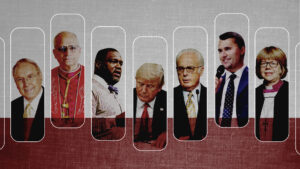When there is no God, there is no grand meaning-maker. We become our own meaning-makers. Far from giving us freedom and joy, creating our own meaning has brought us worry and anxiety.
Consider, for example, how we pursue health. Despite all the care available to us, we’re more anxious than ever. Just think of the couple who newly discovers that they’re expecting. Their joy, anticipation, and excitement are palpable. After their first doctor’s visit, though, a flood of worry overtakes them. What tests should we do? What will we do if we find something wrong?
In his new book, Pursuing Health in an Anxious Age (Crossway), Dr. Bob Cutillo, M.D., reflects on such a situation:
The joy of discovering they are pregnant can be one of the purest in life. But upon entering the medical system, their wonder and awe at a gift received shrivel before efforts to calculate unknown risks, worries about what bad things can happen, and fretful decisions about how to manage the pregnancy to obtain a quality outcome. How quickly the power to control an unpredictable future and the great possibilities to maximize health can transform joy and hope into calculation and concern.
How can we recover a vision of health that aligns with the gospel? Is there a bigger view of health care that can give us hope?
I spoke with Dr. Cutillo—a medical doctor with decades of experience in many different contexts—about how the gospel can reorient us to a wiser pursuit of health for the good of human flourishing.
What convinced you to take time away from your normal activities—practicing medicine and teaching at a seminary—to write this book?

It actually happened in a more confusing way. I was practicing medicine full-time, thinking that was how I would finish my medical career, when slowly but with increasing clarity I got the sense I was supposed to get off the field for a while and sit in the dugout. I didn’t like the idea of doing that and not knowing what was next. After I pulled out, though, I was able to see the next step—to write—which at the time was kind of a ridiculous idea for someone with no writing platform to work from.
But one thing I did have was a clear idea, from years of observation, that there was a growing gap between our expectations for health and medicine and the truth about who we are as human beings. Our current efforts in health care are full of power and possibility. But though policies and practices progress rapidly forward, it feels like a train coming off the rails because we’ve gone too fast, and we have no clear idea where we are going. In order to figure that out, we have to be willing to think about what human beings are in our nature and who we are in our destiny.
In the book you talk about health as a gift to nurture, not a possession to protect. How does that shift in focus change our approach?
One of the evidences we’ve gone off the rails is the way we use the word “healthy.” The word has become slippery, like a well-worn penny that’s lost most of its original markings. If you google the term, you see sites for healthy appetites, healthy recipes, healthy lifestyles. We can even get advice to secure our financial health. All day long we’re talking about things related to “my” health—taking for granted that we even have such a thing.
I hope Pursuing Health in an Anxious Age is like a sudden halt, challenging our assumptions with the simple question: “Do we really have, or own, health?” As Josef Pieper reminds us, “Everything gained and everything claimed follows upon something given, and comes after something gratuitous and unearned; that in the beginning there is always a gift.” I view health that way, and have tried to show how deeply that changes the platform on which we construct our health care.
What is the system of health care for, and how is it broken in accomplishing its purpose?
As someone much wiser than me said when a discussing our broken health care delivery system, health isn’t a deliverable commodity, and care can’t come out of a system. Certainly the system can and should help individuals practice quality health care. But the system can’t address the deepest fears and anxieties that underlie our hope for health.
I remember talking to a patient about an operation for which, technically speaking, there was every reason to believe would help her. She was elderly, so there was risk, but she was in pain and this operation could help. I was moving along in my usual way explaining the benefits despite the risks when she interrupted me and said, “You can stop trying to convince me, I’m going to do it. But I want you to know, I’m scared.” Though people in health care are responding to this concern with great compassion each day, it’s getting harder and harder to hear it in our fragmented, noisy, and demanding system.
How does the gospel inform our engagement with health care—as medical practitioners or as patients?
There are four basic realities I believe we’re failing to face in our present approach to health and health care:
- What do we do with our basic vulnerability as a human species?
- What do we do with our increasingly fragmented view of people and things?
- What do we do with the unavoidable connection between our own health and the health of the community in which we live?
- What do we do with our fear of death?
The gospel responds to these deep realities in a beautiful way. And the good news is that our vulnerability—rather than something to fear, which we must eradicate with our technology or exclude from our field of vision—belongs right at the center of our hope for health.
Editors’ note: Dr. Cutillo will be speaking at The Gospel Coalition 2017 National Conference, April 3 to 5 in Indianapolis. Browse the speaker list and register soon.
Download your free Christmas playlist by TGC editor Brett McCracken!
 It’s that time of year, when the world falls in love—with Christmas music! If you’re ready to immerse yourself in the sounds of the season, we’ve got a brand-new playlist for you. The Gospel Coalition’s free 2025 Christmas playlist is full of joyful, festive, and nostalgic songs to help you celebrate the sweetness of this sacred season.
It’s that time of year, when the world falls in love—with Christmas music! If you’re ready to immerse yourself in the sounds of the season, we’ve got a brand-new playlist for you. The Gospel Coalition’s free 2025 Christmas playlist is full of joyful, festive, and nostalgic songs to help you celebrate the sweetness of this sacred season.
The 75 songs on this playlist are all recordings from at least 20 years ago—most of them from further back in the 1950s and 1960s. Each song has been thoughtfully selected by TGC Arts & Culture Editor Brett McCracken to cultivate a fun but meaningful mix of vintage Christmas vibes.
To start listening to this free resource, simply click below to receive your link to the private playlist on Spotify or Apple Music.


































